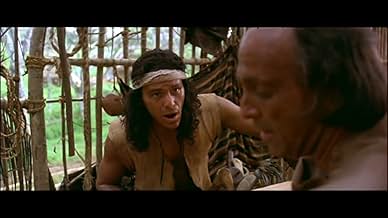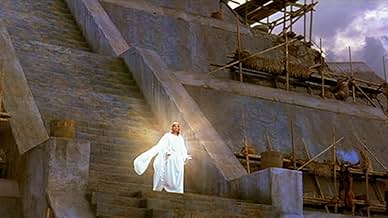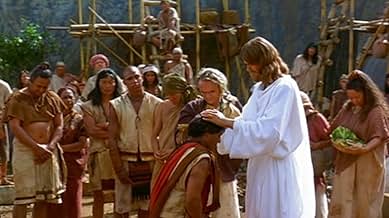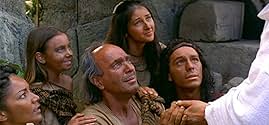CALIFICACIÓN DE IMDb
7.8/10
922
TU CALIFICACIÓN
En América, Helam ve la estrella del nacimiento de Cristo y espera su llegada. Su hijo Jacob se aleja de la fe. Tras la crucifixión de Jesús, Zarahemla cae en tinieblas mientras Helam busca ... Leer todoEn América, Helam ve la estrella del nacimiento de Cristo y espera su llegada. Su hijo Jacob se aleja de la fe. Tras la crucifixión de Jesús, Zarahemla cae en tinieblas mientras Helam busca a su hijo.En América, Helam ve la estrella del nacimiento de Cristo y espera su llegada. Su hijo Jacob se aleja de la fe. Tras la crucifixión de Jesús, Zarahemla cae en tinieblas mientras Helam busca a su hijo.
- Dirección
- Guionista
- Elenco
Jeremy Hoop
- Jacob
- (as Jeremy W. Hoop)
Tomas Ambt Kofod
- Jesus Christ
- (as Tomas Kofod)
- Dirección
- Guionista
- Todo el elenco y el equipo
- Producción, taquilla y más en IMDbPro
Opiniones destacadas
At the risk of being accused of speaking evil of the Lord's anointed, I have to say that this film represents poor judgment on the part of the LDS leaders who conceived and approved it.
Over the years, the LDS Church has made some fine missionary films: "Man's Search for Happiness," "Together Forever," "How Rare a Possession," "The Mountain of the Lord," "Legacy." True, these films are emotionally heavy-handed. They're not calculated to win praise for their subtlety, or irony, or ambiguity, or provocativeness, or originality, or any of the other qualities that make for great cinema by the standards of literary criticism. But these films aren't trying to meet those standards. They're proselyting tools. And judged by the standards of that genre, I think the films I've listed above are well-conceived and well-made.
I cannot say the same for "Testaments." This film is to the Book of Mormon what "The Ten Commandments" is to the Book of Exodus or what "Ben Hur" is to the Gospels--and I don't intend those to be flattering comparisons. I'm reminded of a comment made by a character in LDS playwright Eric Samuelsen's drama "Gadianton": "It is pretty awful. I mean, that book's supposed to be scripture, and they turn it into this cheesy melodrama."
In the south visitors center on Temple Square, they used to show a short film that, like "Testaments," set scenes from Christ's ministry in the Old World (as described in the Gospels) side-by-side with scenes from his ministry in the New World (as described in the Book of Mormon). The film was moving and did a fine job of presenting the Book of Mormon as Christ-centered and as a companion volume to the Bible. Most importantly, in my opinion, this film presented the Book of Mormon with the dignity owed to a sacred text.
In "Testaments," that dignity is seriously compromised. What we get in "Testaments" is part scripture, part romance, part courtroom thriller, part political thriller, part disaster flick, part family values entertainment, and part Indiana Jones-style adventure.
Dare I say that this film represents the literatures of men mingled with scripture?
Walking into "Testaments" today (my second viewing), I heard an LDS teenager ahead of me say that she's seen this film six times. Afterwards, I heard this same teenager and her mother commenting, between sniffles, on how the ending always "gets them." OK. So the film's a tear-jerker. If I want to see a good tear-jerker, I can go to my local cineplex or video rental store. A good missionary film has to do more than make people cry. What I want to know is: Does "Testaments" convince non-LDS viewers to take the Book of Mormon seriously as a sacred text? Does it inspire viewers--LDS or non-LDS--to live more Christlike lives?
Let me clarify: I have nothing per se against fictionalizations of scripture, and I believe that God is great enough to touch people's lives even through cheesy fictionalizations of scripture. I haven't heard any yet, but I'm sure testimonials are forthcoming from people whose lives were transformed by this film.
But a fictionalization of scripture is not scripture. "The Ten Commandments" is not the Book of Exodus. "Ben Hur" is not the Gospels. "Testaments" is not the Book of Mormon. It should therefore not be used in place of the Book of Mormon, which is exactly what's happening every time this film is screened. People who ought to be watching a film designed to showcase the spiritual power of the Book of Mormon are instead being shown a fictionalization of the Book of Mormon designed to make them cry. They're being cheated.
Over the years, the LDS Church has made some fine missionary films: "Man's Search for Happiness," "Together Forever," "How Rare a Possession," "The Mountain of the Lord," "Legacy." True, these films are emotionally heavy-handed. They're not calculated to win praise for their subtlety, or irony, or ambiguity, or provocativeness, or originality, or any of the other qualities that make for great cinema by the standards of literary criticism. But these films aren't trying to meet those standards. They're proselyting tools. And judged by the standards of that genre, I think the films I've listed above are well-conceived and well-made.
I cannot say the same for "Testaments." This film is to the Book of Mormon what "The Ten Commandments" is to the Book of Exodus or what "Ben Hur" is to the Gospels--and I don't intend those to be flattering comparisons. I'm reminded of a comment made by a character in LDS playwright Eric Samuelsen's drama "Gadianton": "It is pretty awful. I mean, that book's supposed to be scripture, and they turn it into this cheesy melodrama."
In the south visitors center on Temple Square, they used to show a short film that, like "Testaments," set scenes from Christ's ministry in the Old World (as described in the Gospels) side-by-side with scenes from his ministry in the New World (as described in the Book of Mormon). The film was moving and did a fine job of presenting the Book of Mormon as Christ-centered and as a companion volume to the Bible. Most importantly, in my opinion, this film presented the Book of Mormon with the dignity owed to a sacred text.
In "Testaments," that dignity is seriously compromised. What we get in "Testaments" is part scripture, part romance, part courtroom thriller, part political thriller, part disaster flick, part family values entertainment, and part Indiana Jones-style adventure.
Dare I say that this film represents the literatures of men mingled with scripture?
Walking into "Testaments" today (my second viewing), I heard an LDS teenager ahead of me say that she's seen this film six times. Afterwards, I heard this same teenager and her mother commenting, between sniffles, on how the ending always "gets them." OK. So the film's a tear-jerker. If I want to see a good tear-jerker, I can go to my local cineplex or video rental store. A good missionary film has to do more than make people cry. What I want to know is: Does "Testaments" convince non-LDS viewers to take the Book of Mormon seriously as a sacred text? Does it inspire viewers--LDS or non-LDS--to live more Christlike lives?
Let me clarify: I have nothing per se against fictionalizations of scripture, and I believe that God is great enough to touch people's lives even through cheesy fictionalizations of scripture. I haven't heard any yet, but I'm sure testimonials are forthcoming from people whose lives were transformed by this film.
But a fictionalization of scripture is not scripture. "The Ten Commandments" is not the Book of Exodus. "Ben Hur" is not the Gospels. "Testaments" is not the Book of Mormon. It should therefore not be used in place of the Book of Mormon, which is exactly what's happening every time this film is screened. People who ought to be watching a film designed to showcase the spiritual power of the Book of Mormon are instead being shown a fictionalization of the Book of Mormon designed to make them cry. They're being cheated.
10katran1
I saw this film with a non-member friend at our local temple, and we were both touched so deeply. I don't cry often during movies, but The Testaments had tears literally streaming down my face, and my friend's as well! It was just so uplifting, so moving, and so emotional. It was beautifully filmed, with gorgeous settings and was very well acted. The actors portrayed the characters in a manner that made them so real. I felt the spirit so strongly while watching this. I can't recommend this movie enough, for both members of the LDS church and non-members as well. We liked it so much that we went to see it again with my three young daughters. They were all touched by the film, even my youngest who is only 6 years old. Even my non-member friend said that he could feel the presence of the spirit while watching the film, and he is now investigating the church. We can't wait to see this film again and I hope that I can add it to my home library someday.
I had heard a lot of things said about the movie before I saw it nearly two years after it opened, and so was wary of whether or not it would live up to its billing. The first 45 minutes of this hour-or-so long film are good, but nothing amazing. Then the action scene and then the scene where Christ comes takes you on an emotional roller-coaster and gets you thinking of what it would be like to be in that situation. It is very touching. Nobody moved for nearly 5 minutes after the film was over, many crying. As one who loves the Book of Mormon, I truly enjoyed how this movie brought to life the most important aspect of it.
This short movie just can not be described with words. When watching this movie, especially at the end, tears were forming in my eyes and I felt a closeness to Christ that I can vividly remember to this day. It has inspired me to be a better person as I was able to witness the love of Christ like no other movie. I encourage anyone to watch this movie - whether you are a member of The Church of Jesus Christ of Latter Day Saints or not. I guarantee you will not be disappointed and you will feel Christ's presence in your heart and be touched. I believe it is still showing in many of the Church's Visitors Centers but may be replaced with a new one that is coming out about Joseph Smith on or around Dec. 24, 2005. See it, before it goes away!
I was able to see this movie when I was visiting in Utah in the Fall of 2003.
Although I can't remember all of the details, I do remember the feeling I had watching the movie. It was awesome. this is the most powerfully spiritual film I have seen, surpassing any of the other church films.
As for the movie, I seem to recall that the acting was quite good, the effects were excellent (especially compared to the BOM movie!), and again the story was powerful. It culminates with the Savior's visit to America, and the scene is touching and powerful. I absolutely loved it. 10/10
Although I can't remember all of the details, I do remember the feeling I had watching the movie. It was awesome. this is the most powerfully spiritual film I have seen, surpassing any of the other church films.
As for the movie, I seem to recall that the acting was quite good, the effects were excellent (especially compared to the BOM movie!), and again the story was powerful. It culminates with the Savior's visit to America, and the scene is touching and powerful. I absolutely loved it. 10/10
¿Sabías que…?
- TriviaMany of The Savior's scenes in The Holy Land are based on pictures and paintings that are popular among the members of The Church of Jesus Christ of Latter Day Saints.
- ErroresThe crucifixion scene in the film is totally wrong as a Jew from the crowd nails Jesus to the Cross and not a Roman Soldier.
- ConexionesEdited into Finding Faith in Christ (2003)
Selecciones populares
Inicia sesión para calificar y agrega a la lista de videos para obtener recomendaciones personalizadas
Detalles
- Tiempo de ejecución1 hora 7 minutos
- Color
- Relación de aspecto
- 2.20 : 1
Contribuir a esta página
Sugiere una edición o agrega el contenido que falta

Principales brechas de datos
What is the English language plot outline for The Testaments of One Fold and One Shepherd (2000)?
Responda























